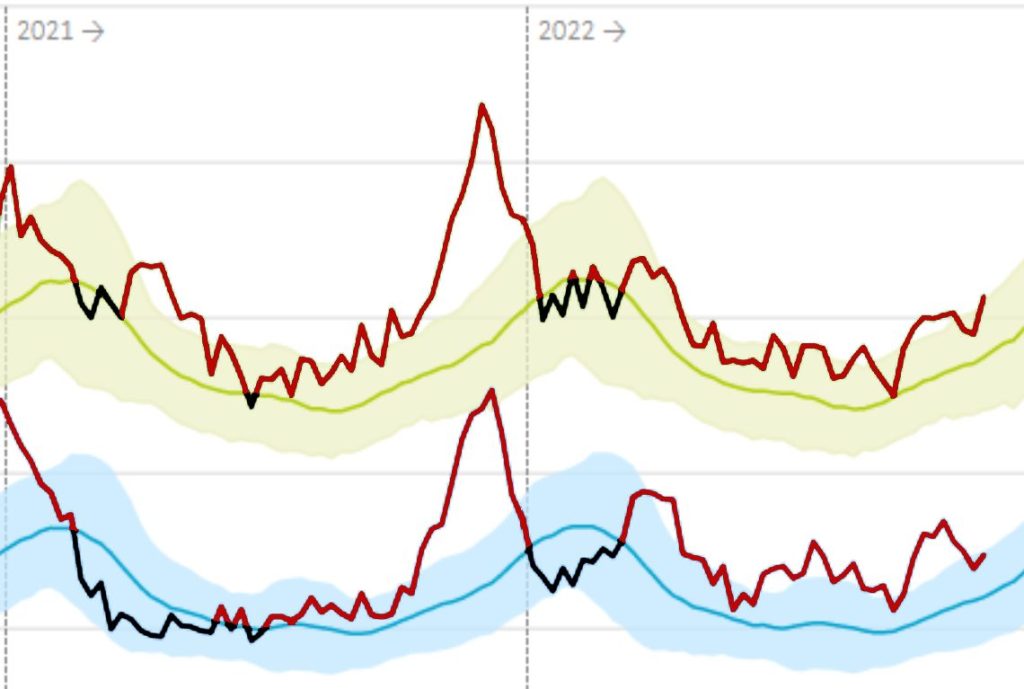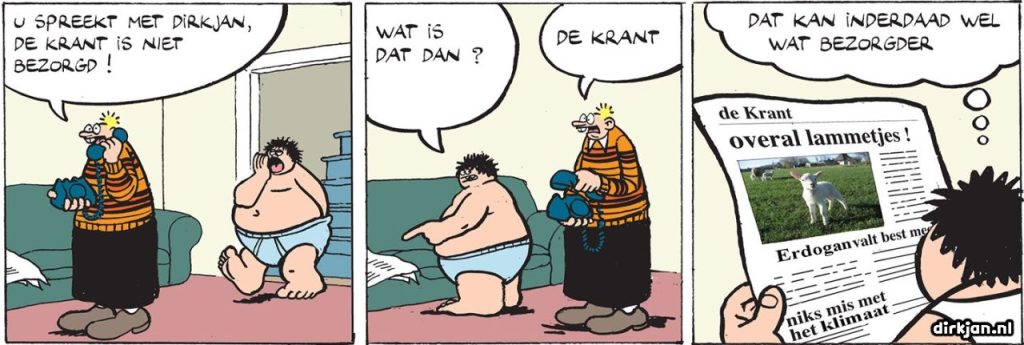How do you tell for the umpteenth time that at least 40 more people a day die per day than you had thought? You would say: by clearly naming that terrible fact, which has been occurring since April 2021. But what if it is your job to support the government in collecting and interpreting figures? Yes, then exactly! you might say. But what if that death could be a direct result of serious issues such as mismanagement, tunnel vision and possibly even violations of laws and regulations, up to corruption and treason? Well, then you are in a split. If you sound the alarm, you will no longer fit into the system and you will not be suitable for your government function. After all, then you no longer support the government, then you are undermining. Then you are a terrorist or fascist, or whatever other immorality stamp is up for grabs at the time.
I'm not going to fillet cbs messages again, that point has already been made repeatedly. It is about time that the CBS Monthly Bulletin writer received a prize, following in the footsteps of people like Diederik Gommers, Marion Koopmans, Jaap van Dissel and Maarten Keulemans. They have defended government policy through the consistent propagation of rabid nonsense and have been praised for it.
For example, look at journalist Merel Ek, who was recently very deservedly nominated for an award. Indeed: deserved because she has clearly shown that she is lying to the camera in the public interest. She lied about her sources, an eminently journalistic skill that she applied creatively. A huge journalistic talent and a pity that she just missed out on this prestigious journalistic prize. After all, it was no less than € 3500,-. That's quite a lot, a little journalist wants to commit a character assassination for that with the microphone of a public broadcaster in her hand.
The prize was won by Stephan Komduur. I've scrolled through his Twitter timeline of the last five months, not a word about excess mortality. Very neat. At the NPO you propagate the state vision or you keep your mouth shut. And looking away may also be honored! "I'm covering almost all crises this week," he writes in early September. Why not that one? I have not read the jury report, but that 'almost' must have been the deciding factor. Brilliant.
Back to CBS
The CBS editor has also sold his soul to a higher cause. He may have looked away from Ruben van Gaalen on Twitter, maybe he writes those messages too.
He often writes about 'just like' or 'just not', which makes everything less bad because close to the limit value. And below that limit, there is nothing to worry about!
Or take the explanatory text with this graph. A drama takes place, this mortality is unprecedented and NEVER SEEN BEFORE: so long and so much. The red lines indicate more mortality. The black lines show a meagre reduction in mortality, much less than you would expect immediately after such large epidemic peaks. What does Ruben write? (Aside from a few missing verbs – it's just a Tweet too)

Do you see the bouncer on the far right at the end of the bottom red line? Ruben uses that to highlight a week with "just no excess mortality." Because it's within the blue margin. While it might as well herald a new rise. Am I the only one who notices that?
Also that last sentence: "Among the rest of the population, there is just #oversterfte, the mortality among WLZ care users is higher than expected." How soothing can you make it sound...
To critics, the angels from the Alpha hell say: "You don't understand it" or "You conveniently omit the bandwidth". This bandwidth in particular is a recurring smokescreen, not to say a stumbling block, for renowned science journalists. I have already devoted two articles to it together with Herman Steigstra, but I will try to make it clear again here. If you understand, explain it to others!
The dice
Every time you roll a dice, you have a 1 in 6 chance of throwing a six. On the second throw another six throw is 1/6 x 1/6 = 1/36. That goes up quickly: the chance of throwing a six 10 times in a row is 1 in 60,466,176 (so 1 in more than 60 million).
What CBS is constantly doing is continuing to assess each throw separately ('nothing special, you have as much chance of a six as of any other number') while they have to see that there is an impossible sequence going on. Indeed: impossible, because, for example, throwing a six 20 times in a row, not a few times and then again 20 times in a row? Then there is something going on, maybe with the dice or with the one who peats the throws. But the man on the scoreboard simply relentlessly judges every point, and every point is clearly really made.
If the number man who peats the throws is hired by the one who paid a fortune for that dice and no one is allowed to watch... So how do you get out of the game? I know people who have put their house up for sale. They are going to emigrate to Portugal. That aside.
The coin
We now simplify the complexity around excess and less mortality to tossing a coin. With a correct coin, we estimate that 50 out of 100 throws become heads. That means 0.5 chance in the lead: the same as 1/2 or 1 chance from two possibilities. The prediction will not be correct with any throw. After all, we had said: a chance of 0.5. You never throw that because you can only throw 1 or 0, head or tail. So the predictor will not have a single throw right. That will also remain the case if you assess per throw because of course you do not look well. In that case, the predictor will defend himself by saying that you should of course look at longer series! Just throw a hundred times, and you'll see that the prediction is close to 1/2!
The margin
The chance that you will keep throwing exactly "around and around" head and tail is just as small as the chance that you only throw a head. Alternating head and tail is not possible, so you will also have to allow some series. For that you have to determine a margin: how long can those series be and within what time frame? For practical reasons, a weekly margin was chosen. There is never any mention of a monthly margin, quarterly margin or seasonal margin. These longer-term margins can be deduced from the weekly margins but are never applied. Why not? For the same reason that the forecaster has previously pointed you to the series. But now with the opposite intention: he will now continue to point out the weekly margin because otherwise the forecast turns out to be out of step.
That is what happens in the CBS reports. Monthly reports are therefore not monthly reports, they are four weekly reports in a row, assessed per week as separate events. Totals are mentioned occasionally, but only if they are lower than a previous period – even if the trend is rising over the longer term.
Good news show from CBS

The gist of the CBS monthly report is that excess mortality is doing well: in October we still had excess mortality in all weeks, in November we see excess mortality in only four weeks.
Also note that the report is reviewed on a weekly basis. No weeks are added up, there is no question of a monthly margin.
The message should have been for a year that since mid-2021 there has been persistent unexplained excess mortality, even in the short periods of under-mortality. It is chilling how the population is being abandoned by healthcare institutions, the medical profession and governments, with a leading role for the EU.
Do you want to arm yourself against disinformation regarding excess mortality? On this site alone there are several articles that can help with that. Also read that suspicious and when in doubt, look for why it is not right – and then also why it is.
Relevant links
The very first excess mortality article, which started it all:




Week 45 did not give any excess mortality in 1st instance but is now 8 in the plus.
Week 46 is only 6 below the excess mortality limit. So next week that will also be above the limit with the follow-up notifications.
Week 47 immediately stands at an excess mortality of 122.
It seems that the decline of the past few weeks is turning into an increase again.
The excess mortality tm week 47 is 10309. (This includes the lower than expected mortality of the 1st 12 weeks)
The official (cbs) excess mortality until week 47 is 4384.
If you roll a dice several times, the chance is always 1/6 that you roll 6. The chance of a 6 if you also threw a 6 before that is 1/36 (nl 1/6 x 1/6). This is called a conditioned probability. Therein lies the difference.
The same applies to the weekly reports. The excess mortality in a week may be within the bandwidth for that one week, but if the week before was also seen excess mortality, that bandwidth for those two weeks together should be smaller, because it is a conditioned probability. Then the chance of excess mortality in week 2 is smaller than in week 1, just like with the dice (the chance of throwing 6 the second time is smaller than the first time).
If you look at the weeks separately, separately, you miss that fact, and that is methodologically incorrect.
Precise! See Bandwidths for dummies and Excess mortality breaks all records